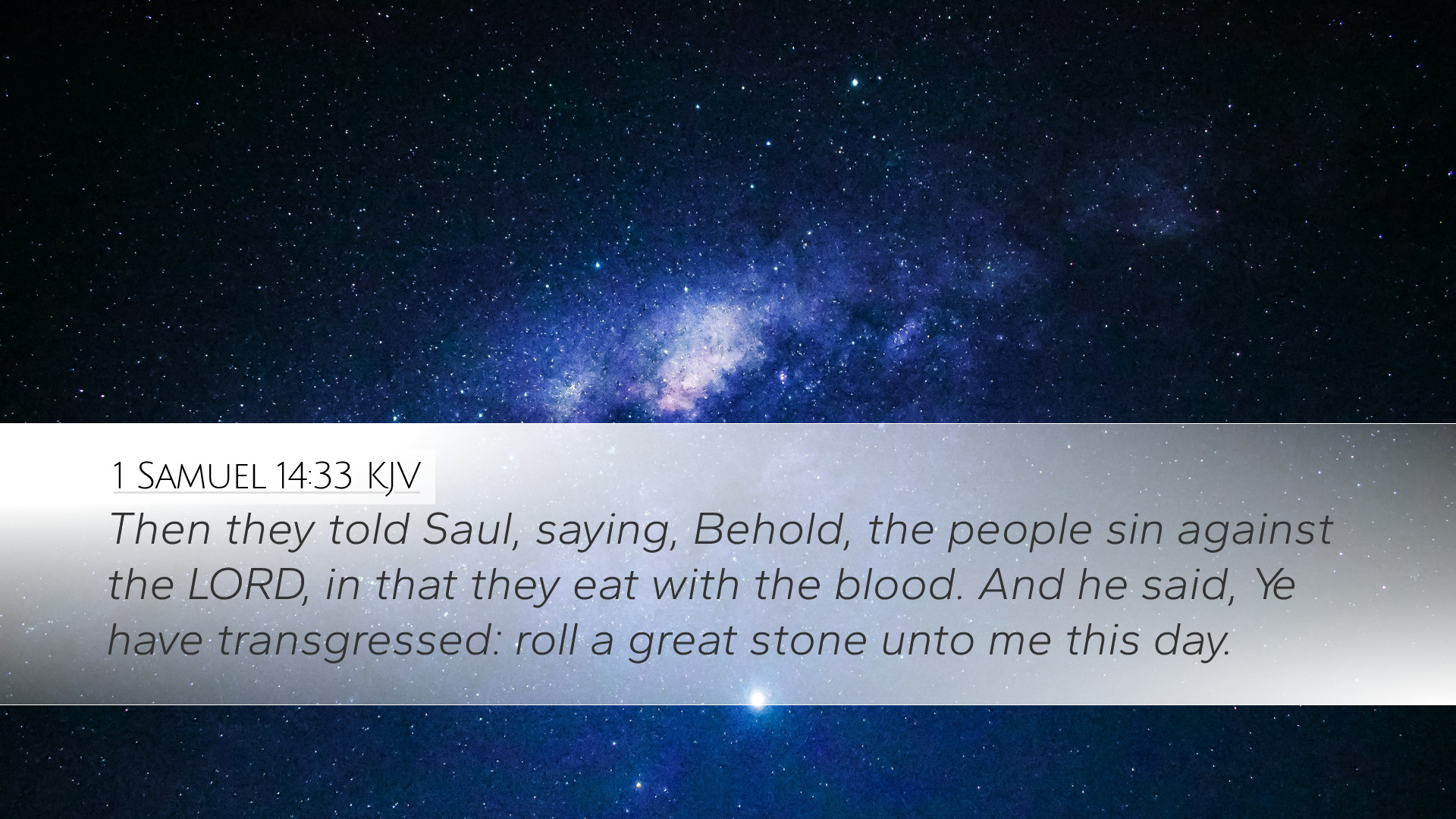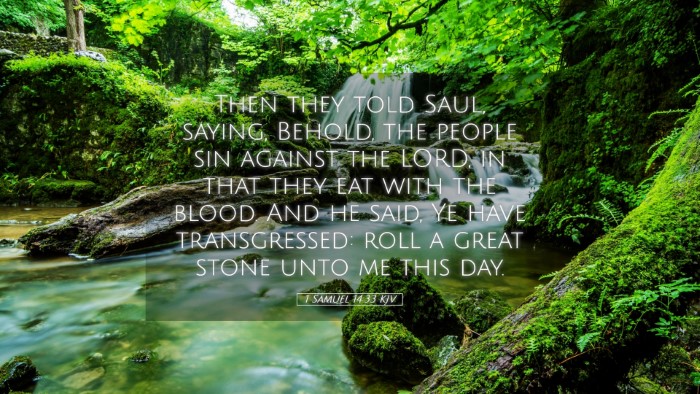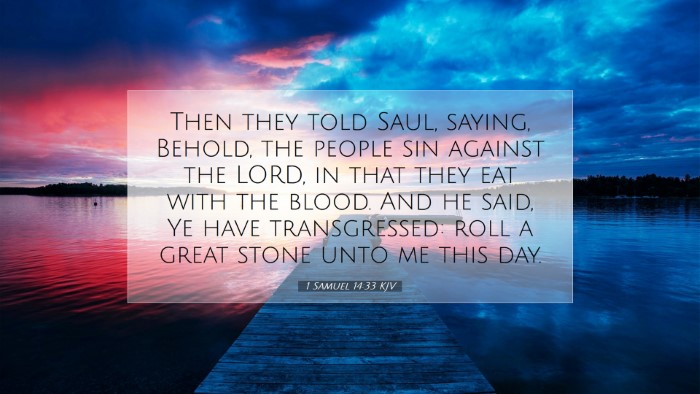Commentary on 1 Samuel 14:33
Verse Text: "Then they told Saul, saying, Behold, the people sin against the LORD, in that they eat with the blood. And he said, Ye have transgressed: roll a great stone unto me this day."
Contextual Overview
This verse occurs during a critical moment in the narrative of 1 Samuel, where King Saul and his army have just secured a significant victory against the Philistines. However, amid this success lies a serious issue regarding the diet of Saul’s troops, particularly concerning the consumption of blood, which was strictly prohibited by Mosaic Law. This commentary explores the thematic elements of leadership, obedience, and the holiness of God as expressed through Saul’s reaction to this sin.
Insights from Matthew Henry
Matthew Henry emphasizes the gravity of sin against the Lord, particularly regarding dietary laws outlined in the Old Testament. He points out that the soldiers, in their haste and hunger, violated the command against consuming blood, which represents life and should be treated with reverence. Henry articulates that Saul's leadership is scrutinized as he reacts to the people's behavior and aims to correct their transgression through a public acknowledgment of their sin.
- Accountability: Henry suggests that Saul's call to roll a great stone signifies an intention to create an altar or a place of sacrifice for atonement. This act serves as a public accounting of sin and an attempt to restore proper worship.
- Severity of the Law: The commentary notes the seriousness of God's laws regarding blood, indicating they are rooted in the sanctity of life, which demands respect and adherence. Henry sees this as a crucial teaching moment for Saul to guide his people back to righteousness.
Insights from Albert Barnes
Albert Barnes provides a detailed exploration of the implications of the dietary laws, especially the prohibition against consuming blood found in Leviticus 17:10-14. He notes that this commandment emphasizes the sacredness of life and soul, highlighting that blood represents the lifeblood of the animal.
- Public Sin: Barnes stresses that the people's sin of eating blood publicly challenges Saul's authority as king and as a leader appointed by God. Such disregard for divine mandates indicates a need for correction and guidance on the part of Saul.
- Saul's Response: In his response, Saul's decision to roll a stone a great distance serves both as a practical and symbolic action. He aimed to provide a clear demonstration of repentance and an opportunity for the people to make amends for their actions.
Insights from Adam Clarke
Adam Clarke provides an exhaustive analysis of both the historical context and the theological ramifications of the verse. He touches on the cultural understanding of blood in ancient Israel, affirming that its consumption was not only a breach of law but also a potential catalyst for divine judgment.
- Relational Dynamics: Clarke points out that the relationship between Saul and his troops is tested in this moment. The king's authority is challenged by the people's actions, and thus he is compelled to act decisively to affirm his leadership.
- Highlighting Obedience: Clarke further elaborates on the cry of the people against their sin, serving as an important moment of collective awareness. This collective sin and acknowledgment is crucial in leading to national repentance and a return to covenant fidelity.
Theological Themes
1 Samuel 14:33 offers a range of theological themes worthy of reflection:
- Holiness of God: The insistence on not consuming blood reiterates the respect and reverence that must be given to God's laws, promoting a lifestyle marked by holiness and obedience.
- Leadership and Accountability: Saul’s response to the people’s sin underscores the responsibility of leaders to guide their followers towards righteousness, emphasizing the need for spiritual oversight and the pursuit of holiness among the community.
- Community Response to Sin: The acknowledgment of corporate sin implicates the entire community in the quest for atonement, reminding us that sin affects not just the individual but the larger body of Christ as a whole.
Practical Applications
In light of the commentary, several practical applications emerge for contemporary audiences:
- Encouraging Accountability: Leaders should foster an environment where sin is openly acknowledged and addressed within the community. Accountability fosters a culture of growth and mutual support in spiritual disciplines.
- Educating on Biblical Standards: Teachings on dietary laws and holiness should be leveraged to deepen understanding of God’s expectations regarding everyday choices, encouraging obedience to His Word.
- Promoting Community Repentance: Corporate worship and communal acknowledgment of sin can bring about profound restoration and spiritual renewal, reinforcing the importance of collective fidelity to God's commands.
Conclusion
1 Samuel 14:33 serves as a poignant reminder of the necessity of leadership and holiness in the life of God’s people. The insights from public domain commentaries encourage spiritual reflection and communal responsibility, urging modern believers to align their lives with divine precepts while fostering a community of obedience and accountability.


